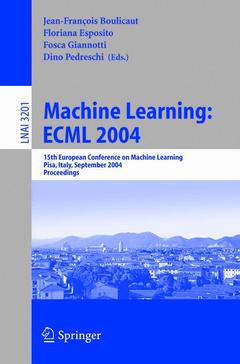Machine Learning: ECML 2004, 2004 15th European Conference on Machine Learning, Pisa, Italy, September 20-24, 2004, Proceedings Coll. Lecture Notes in Artificial Intelligence
Coordonnateurs : Boulicaut Jean-Francois, Esposito Floriana, Giannotti Fosca, Pedreschi Dino

Date de parution : 09-2004
Ouvrage de 582 p.
15.2x22.9 cm
Thèmes de Machine Learning: ECML 2004 :
Mots-clés :
Averaging; Bayesian network; Fuzzy; Random Forest; algorithmic learning; algorithms; association rule mining; decision tree learning; description logics; genetic algorithms; kernel methods; machine learning; proving; reinforcement learning; semantic web; algorithm analysis and problem complexity



